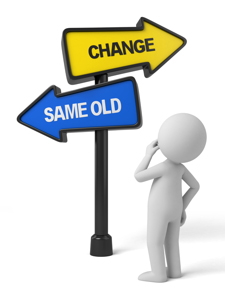
When will nutrition experts stop changing their minds? NEVER! Yes that’s right I don’t think nutrition experts will ever stop changing their minds and actually I’d like to suggest that’s pretty healthy. Frustrating maybe but healthy given the complexities involved in how the human body responds to the huge variety of food and drink that we consume. “But scientists are so clever!” I hear you cry, “look at all the amazingly complex discoveries science has made. We can even map the human genome surely we can work out if butter and sugar are good or bad for goodness sake!!!”

I sympathise and part of me longs to be able to give a clear message “once and for all;” it would make it much easier for people to commit to dietary change for a start. Indeed over the past few months there have been a plethora of TV shows focused on finding out the “truth” about diet and health. Sugar Free Farm, The Truth about Sugar, The Truth about Fat, Trust Me I’m a Doctor and Food: Truth or Scare to name but a few. If I had a pound for every time I heard the phrase “we’re going to find out once and for all….” on these shows I would be pretty rich. I understand why, it’s very compelling – watch this and find out once and for all what to eat. To be fair some of these shows do attempt some science and do highlight some really exciting new developments but rarely do we hear the actual truth, which is that whilst all this is useful, interesting and even ground-breaking, professionals should not alter the advice that they give until the full body of robust scientific evidence has been reviewed and evaluated. Of course many would accuse me of being a boring sheep mindlessly following the establishment rather than an exciting leader calling people to a new path. But like all Dietitians, Doctors and other regulated healthcare professionals I am committed to giving advice that is supported by a balanced evaluation of the available scientific evidence. I cheered for joy when I heard Dr Saleyha Ahsan and Dietitian Lucy Jones give a similar message during the balanced and still very engaging BBC show “The Truth about Fat” last year. You don’t have to sound boring to be professional – well done ladies!
So why is the science of nutrition such a slog? The UK Science Council defines science as:
“The pursuit of knowledge and understanding of the natural and social world following a systematic methodology based on evidence”.
Pursuit is an ongoing thing, actively going after something. I love that the science of nutrition actively strives to make sense of complexity but this work only started at the beginning of the 20th century – by that time other branches of science had been churning out results for hundreds of years – so please give us a chance.
We need to be patient and as a species we are not too good at that, particularly in the modern world of instant this and that.
You see that systematic methodology of science involves both experimenting in short controlled studies and observing over time and there are obvious challenges associated with this when it comes to observing and experimenting with our food and drink.
The most powerful type of experiment when it comes to demonstrating cause and effect is the blind, randomised controlled trial or RCT. For a good lay-person’s explanation see this animation from Cancer Research UK.
To do a good RCT, first we need to recruit people who are prepared to follow a tightly controlled diet for a period of time. If people “cheat” it messes up the results and we all know how easy it is to “cheat” on a diet. Also I’m afraid that when it comes to food and drink we tend to be a bit selective with what we remember so where food and drink recall is involved we need to build in ways to help people give the most accurate report possible. Next we need to be able to divide our sample into the control group and the intervention group and neither group nor the researcher should know who is in which group. Hmm so how do you disguise that low fat or low sugar diet, we all know that these are the things that make our food tasty? We have to make sure that people can’t guess which group they are in as this might impact other behaviours which could affect the results. Having said all this there are some really good randomised controlled trials in the world of nutrition so it is possible, just tricky and as a result often expensive.
Now let’s imagine we achieve all this and do a really robust experiment, what do we know? Well usually that diet “x” causes effect “y” if you follow it under controlled conditions for a short period of time. But of course we don’t live under controlled conditions and we need to know what to eat over a lifetime so we are often still left a bit stuck. This means that we need to combine our understanding from RCTs with longer term observational studies of people whose diets meet the particular criteria that we are interested in. This will never prove cause and effect but it does give useful information to combine with what we know from the RCTs. And this takes me back to patience because we need to observe over time and yet we are all impatient to know “once and for all” what we should eat.
So here’s what I am going to do through this blog series “bite-sized science.” I will try to explain what we do know in an interesting and accessible way, be honest about what we don’t know and let you know about work that’s due to report soon and how it might help us.
If there’s anything you’d like to know more about please leave a comment but whatever you do please remember to enjoy food, we are not machines, eating is supposed to be pleasurable!

